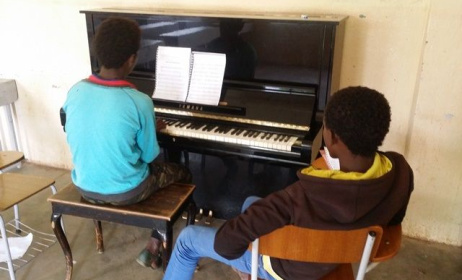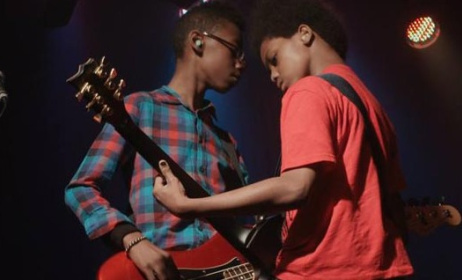Music education in Congo-Brazzaville
By Privat Tiburce Martin Massanga
This text provides an overview of music education in the Republic of the Congo, also known a Congo-Brazzaville.
 It is important to include music classes in the school curricula (photo imgarcade.com)
It is important to include music classes in the school curricula (photo imgarcade.com)
There is a real contrast between the music scene and the methods of introduction to music in Congo Brazzaville. Congo has no real musical education policy. In addition to the country having a huge pool of artists (such as Fredy Massamba, Ballou Kanta, Essous, Zao, Pamelo Mounka, Pierre Moutouari, Franklin Boukaka, Extra Musica, Bantous de la Capitale, etc) the country's political capital, Brazzaville, was declared the “City of music” on 12 October 2013, following its inclusion into the UNESCO Creative Cities Network, the first African city to receive such an international recognition.
However, music education is often lacking in schools and other places, even though the country is home to the Pan-African Music Festival (FESPAM), one of the largest events on the continent that takes place every two years.
Music education in schools
"Congolese schools are in crisis and problems that undermine it are many and varied. Indeed, many studies have led to the same conclusion that education is in decline. This diagnosis has always been accompanied by solutions whose implementation, in most cases, requires considerable resources: human, material and financial," highlights from a 2001 report by the International Bureau of Education of UNESCO. This includes music education.
Congo-Brazzaville is one of the most literate countries in Africa. Public schools are free with compulsory education for children aged six (06) to sixteen (16). In the past 70-80 years, Congo was among the countries in the world that achieved universal schooling. This did not include music education, if at all. During the years of communism, music was only learned through "revolutionary songs" especially during cultural events driven by informal music teachers. Any teacher or tutor could direct a choir of young children.
Today, the school curriculum (public education) excludes music lessons. While at high school, music education is taught by learning notes and names of musical instruments. Lectures do not include practice. Students rarely have, if ever, the opportunity to touch a musical instrument. Since the late 80s, even school choirs ceased to exist. "We are surprised that our children lack creativity. Music is not taught. Music initiates and develops many abilities in children. We should not be surprised if nowadays, young musicians do not even know the structure of a song or the harmonization of a choir. Our kids have no real musical education," states Ghislain Pambou, music teacher at the National School of Fine Arts. However, some private schools in major cities (Brazzaville, Pointe-Noire, and Dolisie) offer a proper introduction to music. This is particularly true in Catholic schools, French schools and some schools affiliated with UNESCO. Children can enjoy music lessons with practical exercises by trained teachers.
Tertiary education
The Paul Kamba National School of Fine Arts is the only entity allowing its students to learn and specialize in music or visual arts. Founded 34 years ago on the ashes of the former Centre for the Study of Fine Arts (renamed École nationale des beaux-arts Paul-Kamba on 14 April 1984 in memory of one of the pioneers of Congolese music), recruitment is exclusively through examinations from the first cycle of secondary school. Training lasts four years as follows: one year of introduction and three years of specialization. The school trains the elite and music executives who go on to teach in schools and practice music as a profession. Some notable examples include Harold Nganga, Prince Mayindou and Liz Babindamana. It goes without saying that this school is accessible to few. Quotas are limited.
Music education and the church
Generally speaking, the church, among other missions, has always quietly offered music education to the young faithful. Catholic, Evangelical, Kimbanguist and Salvationist and even the Revivalist churches, very popular and present in all countries, are the only places where youngsters are introduced to music although the artistic vision is limited to the sacred and to a certain category of music or singing imposed by the ecclesiastical body. There are many children in the choirs and other groups interested in musical instruments or vocalisation. The most talented singers or instrumentalists break away from the church mould. Examples include the younger generation; some of them honed their skills in churches: Roga Roga and Espé Bass of Extra Musica, Jackson Babingui, Oupta or Nteko.
Self-learning and private initiatives
Learning music in Congo is often a personal and family initiative. Most of those interested in the art of Apollo learn by imitating a relative that plays or sings if it is not initiated by the latter. Most young instrumentalists have learned from friends, seniors or a private tutor.
To compensate for the gap in music education, several organizations bring music to the youth interested in music. The French Institute (in Brazzaville and Pointe-Noire), the Russian Cultural Centre in Brazzaville and the Cultural Centre Jean-Baptiste Tati Loutard in Pointe Noire sometimes organize introductory workshops for the youth. Apart from these institutions, it is worth mentioning the initiative of the jazz musician Fredy Mabanza, who recently launched La Maison de l’Education Musicale at the quartier Plateau de 15 ans in Brazzaville. A popular centre introducing many children to various musical instruments.
Sources:























Commentaires
s'identifier or register to post comments